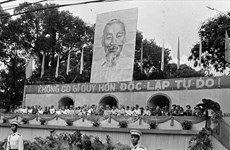UNESCAP speeds up green growth roadmap in Asia-Pacific
The UN Economic and Social Commission for Asia and the Pacific (UNESCAP)
held its 6 th Ministerial Conference on Environment and Development in
Asia and the Pacific, which aimed to speed up the Green Growth
approach, in the Kazakhstan capital of Astana on Sept. 27.
The UN Economic and Social Commission for Asia and the Pacific (UNESCAP)
held its 6 th Ministerial Conference on Environment and Development in
Asia and the Pacific, which aimed to speed up the Green Growth
approach, in the Kazakhstan capital of Astana on Sept. 27.
Speaking at the conference, Rae Kwon Chung, Director of UNESCAP’s Environment and Development Division, said “Green growth offers the unique opportunity for developing countries and emerging economies to leapfrog from the conventional and costly “pollute first and clean up later” trap to an ecologically-efficient, inclusive and sustainable growth paradigm.”
The Green Growth approach will continue to serve as the cornerstone strategy leading the region into an environmentally sustainable economic growth paradigm and helping to address the current triple challenges of converging economic, resource and ecological crises, he said.
The Green Growth approach, which originated from the fifth UNESCAP Ministerial Meeting on Environment and Development held in Seoul in 2005, can be implemented through cross-border and inter-regional programmes to harmonise environmental and development practices and strategies across the Asia-Pacific region.
Noeleen Heyzer, Under-Secretary-General of the UN and Executive Secretary of the UNESCAP said that the conference will hasten regional countries to improve the quality of economic growth through effectively addressing environmental challenges.
According to research and policies advocated by the UN and UNESCAP, a Green Growth approach requires a fundamental transformation of the conventional economic structure to effectively address economic, environmental and social challenges of the region through a concept of eco-efficiency.
WB studies show that although the region is leading the world in overcoming the economic and financial crisis, it also needs to speed up the process of economic integration and make progress in environmental protection, along with balancing the demand for growth and environmental protection responsibility.
Regional countries including Indonesia, Thailand, Malaysia and the Philippines should accelerate their roadmaps to build a knowledge-based market while Vietnam, Laos, Cambodia and Myanmar need to boost trade activities./.
Speaking at the conference, Rae Kwon Chung, Director of UNESCAP’s Environment and Development Division, said “Green growth offers the unique opportunity for developing countries and emerging economies to leapfrog from the conventional and costly “pollute first and clean up later” trap to an ecologically-efficient, inclusive and sustainable growth paradigm.”
The Green Growth approach will continue to serve as the cornerstone strategy leading the region into an environmentally sustainable economic growth paradigm and helping to address the current triple challenges of converging economic, resource and ecological crises, he said.
The Green Growth approach, which originated from the fifth UNESCAP Ministerial Meeting on Environment and Development held in Seoul in 2005, can be implemented through cross-border and inter-regional programmes to harmonise environmental and development practices and strategies across the Asia-Pacific region.
Noeleen Heyzer, Under-Secretary-General of the UN and Executive Secretary of the UNESCAP said that the conference will hasten regional countries to improve the quality of economic growth through effectively addressing environmental challenges.
According to research and policies advocated by the UN and UNESCAP, a Green Growth approach requires a fundamental transformation of the conventional economic structure to effectively address economic, environmental and social challenges of the region through a concept of eco-efficiency.
WB studies show that although the region is leading the world in overcoming the economic and financial crisis, it also needs to speed up the process of economic integration and make progress in environmental protection, along with balancing the demand for growth and environmental protection responsibility.
Regional countries including Indonesia, Thailand, Malaysia and the Philippines should accelerate their roadmaps to build a knowledge-based market while Vietnam, Laos, Cambodia and Myanmar need to boost trade activities./.












